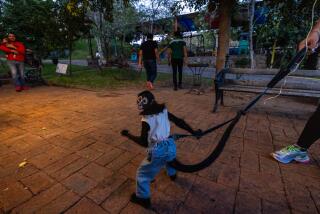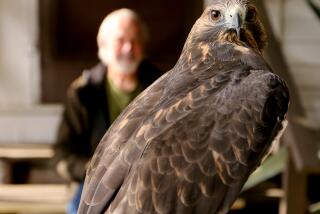Colombia refuge for forlorn wild animals fights for survival
CALI, Colombia — Ask Ana Julia Torres how many children she has, and she’ll say 652: two human offspring plus the hundreds of tigers, lions, mules, snakes, monkeys and other species residing at her refuge north of here. The creatures have typically been seized from or cast off by narcos, circuses, animal traffickers and bored collectors.
Her reference to the “children” inhabiting her 8-acre private facility, named Villa Lorena after her daughter, reflects her deep love for the animals. One of her four lions seems to return the sentiment. After Torres approached his cage, she and the enormous cat named Jupiter exchanged a hug through the bars.
“That was the most sincere hug I ever get,” said Torres, a 54-year-old private high school principal, as she led a visitor on a tour of the sprawling refuge. “It’s human hugs that frighten me.”
Since she opened the refuge in southwestern Colombia in 1984, National Police officers assigned to an environmental crimes unit have brought her a succession of lions, camels, tigers, ostriches, monkeys, flamingos, turtles and other wildlife that public zoos don’t want or can’t accommodate.
Many of the animals, particularly the big cats, have been abandoned — and often mistreated — by circuses. Others were once in the private collections of drug traffickers, who have a penchant for accumulating exotic species. One of her 11 Bengal tigers was owned by a narco who fed it human flesh, police say.
“We know she will take them in and give them love, food and affection,” said Colombian National Police Cpl. Eliecer Zorrilla, a member of the environmental squad, who said most of the animals arrive at Villa Lorena sick, malnourished or abused. “Usually the only other option we have for these animals is euthanasia.”
Before buying land to open the refuge in 1984, Torres took in stray dogs, at one time housing 35 of them. “There was no animal shelter in Cali back then. I couldn’t let them starve,” Torres said after playing a game of hide-and-seek with a chimpanzee she got from a retired circus owner in Venezuela.
But Torres said love alone can no longer sustain the refuge. She has plowed all her available assets, including an inheritance, into the shelter, she said, and will now have to close it within a year unless she gets financial help. She hasn’t paid her 10 employees in three months, she added.
The local and national governments have turned down her requests for aid and she has had to hustle for private and corporate donations to feed and maintain the animals. She declined to disclose her annual budget, but said she was tapped out and that the bank was threatening to repossess her small pickup truck.
Still, she said, she doesn’t turn away any abandoned or abused animals.
The environmental police help out by providing at no charge the main source of food for her big cats: the carcasses of horses killed by vehicles. Supermarket chains give her leftover meat and fruit.
But the funding shortfall means a sick tiger has gone without medication because she doesn’t have the $250 to pay for a veterinary visit.
“If she closes, we’ll be up in the air, with no place else to go,” said Zorrilla, who added that the police were aware of Torres’ financial straits.
Local zoos won’t take the animals because they haven’t the room or the protections against communicable diseases, Zorrilla said. Colombian law prohibits releasing animals seized from collectors into the wild, either because they can’t defend themselves or could pose a health risk to the rest of the population.
Meanwhile, the scenes at Villa Lorena continue to play out, heartwarming on the one hand and deeply troubling on the other because of the cruel histories of many of the animals. One tiger arrived with its back broken, another blind, apparently the result of a circus trainer’s whip. Torres also takes in mutilated monkeys and birds.
“That’s why most of the animals arrive here angry and aggressive,” she said. “With time and love they become docile. Every one of them thanks me in their way. But I can only go on so much longer, taking on the responsibility and the costs myself.”
Kraul is a special correspondent.
More to Read
Sign up for Essential California
The most important California stories and recommendations in your inbox every morning.
You may occasionally receive promotional content from the Los Angeles Times.










